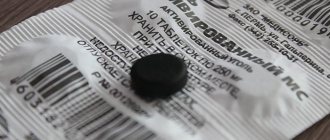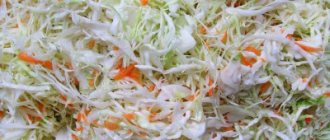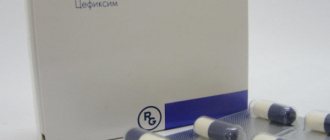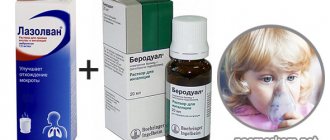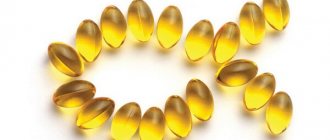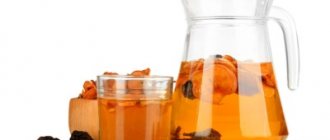Medicinal properties
The use of the drug is accompanied by an enterosorbing and antidiarrheal effect. Effectively removes waste, toxins, poisons, alkaloids, chemicals and drugs. The benefit of activated carbon is also that it can adsorb metabolic products in the human body: cholesterol, urea, bilirubin and other substances that provoke intoxication.
Coal acquires sorption properties precisely during the activation process. This way he gets a surface with a large number of pores and an active sorption surface. Pores bind and evacuate unwanted substances from the body.
It is not toxic to the body, is not absorbed in the gastrointestinal tract and does not irritate the mucous membranes. It is completely excreted within 24 hours in feces.
Reviews
This medication has existed on the pharmacological market for a very long time and is known to almost all parents. It is used when children experience vomiting, nausea, intestinal infections and flatulence. Many parents prefer this medicine because it is a time-tested drug. Others use more modern enterosorbents and explain this by the fact that activated carbon is available in tablets, which not every child agrees to take. Many children have difficulty swallowing the drug in this dosage form, so sorbents in gels or suspensions are prescribed for them. Another negative factor: the child needs to take several tablets at once in one dose, which also poses certain difficulties.
Indications for use
A doctor may prescribe a child aged two years to drink activated charcoal to treat the following pathologies and conditions:
- food and household poisoning;
- intoxication with medications;
- pathologies of the digestive tract with flatulence and dyspeptic disorders;
- allergies to food and/or medications.
Activated carbon is recommended to be taken in case of increased bilirubin levels due to hepatitis or jaundice of any etiology. Prescribed for preparation for instrumental studies of the gastrointestinal tract.
The use of activated carbon can eliminate symptoms such as vomiting, diarrhea, weakness, flatulence that accompany poisoning or diseases of the stomach and intestines.
How to give activated charcoal to newborns and infants
Activated carbon is considered the most inexpensive adsorbent, which has virtually no side effects or contraindications.
Thanks to this, it can be prescribed to people of all ages as first aid for poisoning and in the complex treatment of certain diseases.
Doctors often prescribe activated charcoal for newborn babies who have congenital jaundice. This medicine neutralizes dangerous bilirubin and promotes rapid recovery.
Carbon tablets in the treatment of newborns
The drug is one of the available adsorbents; it well absorbs toxic substances that enter the body or are released during the digestion of food..
Activated carbon is prescribed to infants for a number of diseases. This medication is considered safe as it rarely causes side effects.
Thanks to black powder, all harmful substances are quickly removed from the body, thereby strengthening the immune system.
The pharmaceutical industry produces activated carbon in four dosage forms - tablets, capsules, powder and black paste. The attending physician usually selects the form of the drug based on the age of the young patient. Infants are most often prescribed powder, which is first diluted with water.
If there is no charcoal powder in the pharmacy, then it doesn’t matter. It is quite possible to prepare it yourself. To do this, roll a rolling pin over the blister of tablets and the medicine for a child under 2 years of age is ready. It is diluted in a small volume of water to a suspension, and then given to a small child.
This adsorbent successfully treats diarrhea, which is caused by intestinal infections and many poisonings. The substance consists of many pores that attract toxic substances, like a sponge, and prevent them from being absorbed into the bloodstream.
It must be remembered that activated carbon is not able to help with poisoning by concentrated acid or alkali.
Activated charcoal quickly eliminates cutting pain in the tummy and bloating, and also reduces colic in an infant in a matter of minutes.
In case of dysbacteriosis, doctors try not to prescribe this sorbent to children, since it is not characterized by selective activity and removes both useful and harmful substances from the body.
In this case, it would be more appropriate to prescribe enterosgel and probiotics.
Indications for use
Activated carbon is indicated for newborns and infants in the following cases:
- For food intoxication, which is accompanied by nausea, vomiting, fever and loose stools (sometimes an enema for infants can help with such symptoms).
- From prolonged jaundice of newborns.
- With constant colic in the tummy, which is accompanied by disturbances in sleep and general well-being.
- With diarrhea and increased accumulation of gases in the intestines.
- For dermatitis.
In addition, the drug is prescribed to infants for digestive disorders that are caused by improper nutrition of the nursing mother. Before you start taking this adsorbent, you should definitely consult with the pediatrician who is monitoring the baby.
It is impossible to take charcoal preparations for a long time, as they remove vitamins and minerals from the body.
How to take charcoal correctly
In order for the adsorbent to be as effective as possible, it is necessary to correctly calculate the dose and select the dosage form. Activated carbon for jaundice in newborns is usually given several times a day, treatment lasts up to 5 days .
When determining the maximum daily dose, the doctor must take into account the baby’s weight.
- If you weigh up to 3 kg, give ¼ of a black tablet 3 times a day.
- With a weight of 3-5 kg, 1/3 of the tablet is indicated 3 times a day.
- With a weight of 5 to 7 kg, give ½ tablet up to 3 times a day.
- If the baby's weight is from 7 to 10 kg, then give a whole tablet, up to 3 times a day.
Activated carbon for colic is given to the child for 3-4 days; for allergic dermatitis, treatment lasts 5 days . The adsorbent is given to the child one and a half hours before meals or after the same time period after meals. You should not take charcoal together with other medications, as it reduces their effectiveness.
It is advisable to drink charcoal preparations on an empty stomach. In this case, the sorbent will not affect nutrients and vitamins from food.
How to properly give adsorbent to a newborn
Treatment of young children with activated carbon has its own characteristics. First of all, it is very important to properly prepare and give the medicine to your baby:
- If there is no ready-made coal powder, then grind the tablets well. The resulting mass should not contain large granules, as the baby may choke .
- The resulting powder is diluted with a small volume of boiled water to the consistency of sour cream.
- The resulting mixture is given to the infant from a teaspoon or using a disposable syringe with the needle removed.
- The baby must be given 50 ml of water to drink the adsorbent, so the medicine will get into the stomach faster.
- The daily dose of the drug is divided into 2-3 doses and given at regular intervals.
The duration of therapy is determined by the attending physician, but usually treatment lasts from 2 to 5 days . Longer treatment is undesirable, as it can lead to vitamin deficiency in the baby.
If the baby has a tendency to constipation, then it is better to give preference to another adsorbent.
Allergy treatment
Activated carbon can also help with a number of allergic diseases. This sorbent successfully treats the following conditions:
- atopic dermatitis;
- bronchial asthma triggered by allergens;
- allergic rhinitis;
- conjunctivitis of allergic origin.
In addition, the sorbent is used in the recovery period, after treating allergies of various origins.
Coal is most active in case of an allergic reaction to certain foods . In this case, the intestines are unable to completely remove all waste products from the body; they accumulate, which is manifested by a skin rash.
Activated carbon is a universal sorbent that is found in almost every home medicine cabinet. This drug has almost no contraindications or side effects, so it is allowed even for newborns.
Source: https://otravlenye.ru/det-otravlenie/deti/aktivirovannyj-ugol-dlya-lecheniya-novorozhdennyh.html
Mode of application
The dosage depends on the severity and type of the disease, and is finally determined by the attending physician. For children aged 2 years, the dosage of activated carbon is calculated by weight. On average - 50 mg per kg of weight three times a day . The maximum dosage that can be given to a child at a time is 200 mg per kilogram of weight.
Children are given the drug in the form of a suspension. To do this, the calculated number of tablets is crushed into powder and diluted in water to form a suspension. The duration of treatment for acute conditions in children is no more than five days. Chronic and allergic diseases in children are treated for up to two weeks.
In case of acute poisoning, the child is prescribed gastric lavage with a suspension of activated carbon, then given the suspension with a calculated dosage by weight orally.
Analogues of the drug
Instead of activated carbon, you can give your child other medications with the same substance, for example, the drugs “Sorbex” or “Carbopect”, which are produced in capsules. In addition, there is a medicine in which aluminum oxide is added to activated carbon to increase efficiency. This is powder for Enterumin suspensions. It is prescribed to children for various indications, for example, for hepatitis, intestinal infections or allergic reactions.
In addition to activated carbon preparations, a specialist may recommend enterosorbents containing other active ingredients, for example:
- "Polysorb MP" - removes toxins and pathogenic compounds due to colloidal silicon dioxide. It is produced in the form of powder for suspensions and is used for children of any age for poisoning, diarrhea, renal failure, etc.
- “Smecta” is a medicine containing aluminosilicate (a natural component) and is available in powders with the aroma of orange or vanilla. The drug is prescribed to children for treatment with antibiotics, food allergies, vomiting, and abdominal pain.
- "Enterosgel" is a sorbent that works thanks to polymethylsiloxane polyhydrate and is produced in the form of a gel. The drug binds harmful substances without damaging the digestive tract. In demand for hepatitis, dysbacteriosis, intestinal infections and other problems.
- “Polyphepan” is an enterosorbent that contains hydrolytic lignin obtained from the processing of coniferous trees. Effective for poisoning, burns, food allergies, asthma and other diseases. Can be used at any age.
It is recommended to study the instructions for activated carbon in advance. When children are vomiting, this drug will help almost immediately.
Side effects
After taking this medication, a child’s stool usually turns black, but this should not frighten parents, since the change in the color of stool is not associated with the harmful effects of charcoal on the child’s body. In some children, this medication can cause constipation or, conversely, loose stools, as well as dyspepsia. Giving activated charcoal to children for a long period of time can negatively affect the absorption of calcium, vitamins, protein and other nutrients.

